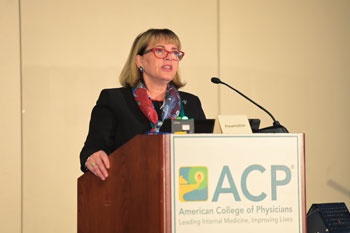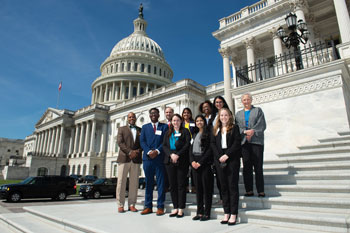Diversity in leadership begins with sponsorship
ACP's President reflects on sponsoring diversity at the chapter level to promote future national governance.
On April 30, 2022, I became just the fourth African American President of ACP since the organization's founding in 1915. Although I am honored to have this amazing opportunity, I have spent many days and nights wondering how and why this statistic is relevant in 2022.
I decided to take a deep dive into ACP history to help me understand the past in order to focus on ways to improve the future. ACP does not have a record of when the first Black physician was admitted to the College as a member, or who that person was. However, we do know that the College did not begin tracking Black membership until 1947. We do know that from 1947 to 1960, 37 Black physicians were elected as members. I would like to acknowledge that the ACP membership policy records did not reveal any documented exclusionary policies. ACP first installed computers in 1971 that electronically tracked demographics, but these were limited to three races: “Negro,” “Oriental,” or “Caucasian.”
In 1971, the College's first formal recorded action to develop recommendations on diversity in College activities was an ad hoc Committee on Medical Educational Opportunities for Minority Groups. Blacks were the largest minority group of that era and became of a focus of the ad hoc committee. In 1974, as a result of the ad hoc committee, ACP elected the late W. Lester Henry, MD, MACP, as the first Black member of the Board of Regents, and he was also the first Black member to receive Mastership. During the same year, 1974, the late Alvin Thompson, MD, MACP, was elected as the first Black ACP Governor for the Washington and Alaska Chapters.
In 1992, the Board of Regents charged all committees to examine how diversity could be integrated into each committee's activities. In 1995, Gerald E. Thomson, MD, MACP, was elected as the first Black ACP President. In 2008, an African American task force was convened, which made recommendations to enhance diversity at the chapter level. ACP broadened and enhanced its diversity work in 2017 when a diversity, equity, and inclusion (DEI) task force was created that subsequently advanced to a formal ACP committee. In 2021, as the pandemic and the visibility of systemic challenges continued to be revealed in our country and within our health care infrastructure, ACP placed advancing DEI at the forefront of its strategic focus, as one of four key multiyear priorities to be resourced and addressed.
I am fortunate to have been a part of ACP leadership over the past five years to engage, advance, and sustain the commitment to an equitable and inclusive culture through intention, collaboration, and investment. Despite the national work that has been done in DEI from committed past and current ACP leaders, the pathway to leadership within ACP should ideally be fostered at the local level, with chapters incorporating DEI principles for their respective councils and committees to enhance engagement and inclusion. Promoting DEI principles at the chapter level through awards, nominating committees, and appointments creates an intentional foundation that can develop and promote leaders through the College, especially for underrepresented groups. Leadership and culture change start at the top, and the College has made the commitment to DEI principles as a priority on a national level, but improvements are warranted to filter and infuse these same principles to the chapter level and plant the seed that can nourish leadership growth and opportunities.
As I reflect on my own pathway, I was fortunate as an early-career physician to have mentorship from ACP leaders within my own chapter. However, more essential than mentorship, I was blessed to have had sponsorship. Mentorship is essential as it supports an individual with advice, counsel, and guidance, but sponsorship takes this process a step further and creates opportunity. I am proud to say that Tennessee Chapter leaders (the late Fred Ralston, MD, MACP, President Emeritus; Stephen Miller, MD, MACP; and Kenneth Olive, MD, MACP) sponsored and made room for me by creating opportunities for me to manifest and enhance my leadership abilities within the chapter. I am forever grateful for those opportunities. If this level of sponsorship were magnified across all chapters, diversity could be engrained in the infrastructure of our organization.
This column focuses on the underrepresentation of Black ACP leadership primarily because the College has the most documented historical data on the Black race demographic, based on this country's past. In addition, this focus aligns with my personal reflection in answering the question as it relates to my own journey.
However, my encouragement and call to action for DEI principles and sponsorship to be embraced at the chapter level should be broadened to incorporate all underrepresented groups. The lesson is that in order to have more diversity in leadership, the seed needs to be planted locally, at the chapter level. This is an opportunity for chapters, councils, and nominating committees to assess practices and policies as they relate to fostering talent that can be more representative of society, the physician workforce, and ACP membership.
This concept of sponsorship extends even beyond ACP, to residency training programs, medical practices, academia, and other professional organizations and societies. I am proud of the DEI work that ACP has intentionally committed to and invested in. However, there is still progress that needs to be made, as DEI is a journey and not a destination. I look forward to witnessing this continued progress across the College that can filter down to the local chapters by transforming mentorship into sponsorship. I will conclude with the saying, “Tell me and I may listen, teach me and I may remember, but involve me and I will learn.”





